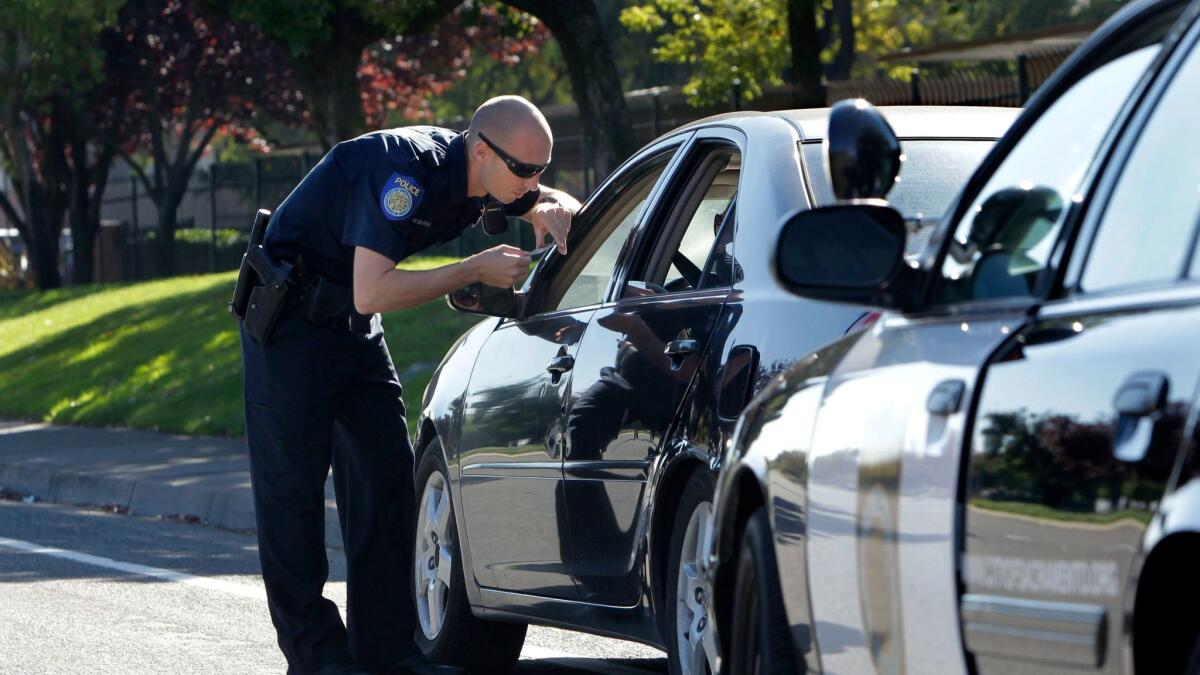Op-Ed: Suspending driver’s licenses for missed traffic court dates does more harm than good

- Share via
Reforms to help California’s low-income workers hit hard by the coronavirus crisis don’t need to have hefty price tags. Gov. Gavin Newsom could help eliminate a formidable barrier to employment for hundreds of thousands of struggling Californians. It would cost next to nothing, and the state would be one of the first in the nation to do it.
In early January, when Newsom puts forward his 2021 budget proposal — his primary opportunity to shape state policy — he can lay the groundwork for all California courts to stop suspending people’s driver’s licenses when they miss their traffic court dates.
License suspensions for missed court dates happen to about 40,000 Californians a month in a typical, non-pandemic year. It’s an extreme penalty, and it falls heavily on the poor and people of color. In the long run, the practice as it’s applied to minor traffic offenses does far more harm than good for the state.
Donna Harati, director of legal services at Homeboy Industries, collaborates with the California Back on the Road Coalition, a consortium of groups that advocate limiting license suspensions to dangerous drivers only. She has seen firsthand how a lesser infraction can lead to a missed court date that compounds to pull people down.
Someone gets a ticket but cannot get time off to make it to court, Harati explains. Others cannot afford the fine and are scared they’ll be jailed if they show up. Or they fear being arrested for their immigration status. Some with unstable housing never even get a notice to appear.
“When you’re struggling to get by,” Harati said, “there are so many systemic barriers that make it hard to get to the courthouse.”
The results of a lost license can hit hard. One study showed that 40% of those who had their driver’s licenses suspended lost their jobs within six months. That’s not surprising when you consider that driving may be required by an employer, and that 80% of Californians drive to get to work.
For those who don’t have the wherewithal to deal with a citation in the first place, suspension only digs them in deeper. If people feel forced to keep driving despite the suspension — to get their kids to school or go to work — every time they get behind the wheel, they could get pulled over and discovered. Driving without a license is a misdemeanor offense. “You can be arrested, charged, and your car can get towed,” said Harati.
The cycle is especially pronounced in the poorest neighborhoods, and the racial disparities are extreme. According to an analysis of DMV and census data by the Back on the Road Coalition, poorer neighborhoods have heavier police presences, which means more traffic stops, more tickets, more potential for missed court dates and, once a license is lost, more chances that someone who keeps driving will get caught. The coalition’s report “Stopped Fined and Arrested” shows driver’s license suspension rates as much as five times higher in Black and Latino communities compared with white communities.
Fortunately, we know that reform pays off. Under pressure from local civil rights organizations, San Francisco Superior Court stopped suspending licenses for “failure to appear” in 2017, and it began to reassess long-standing suspensions as well. In 2019, the court lifted 88,000 holds on driver’s licenses. The Superior Court’s action built on a previous related reform: In 2015, San Francisco had ended the practice of suspending driver’s licenses for unpaid traffic tickets.
Outsiders often assumed that without the hammer of driver’s license suspensions, failures to appear would increase and courts would lose needed revenue generated by traffic fines. In fact, San Francisco court officials report no difference in appearance rates since the 2017 change. And research conducted by the Financial Justice Project in San Francisco — my office — shows that court revenue per traffic citation actually increased after both reforms.
The reason is simple — people are better able to settle fines if they can still hold a job. San Francisco also found that, in general, punishment isn’t the only — or the best — way to get people to meet their obligations. Not only did the Superior Court stop suspending licenses over traffic-fine debts and missed court dates, it made it easier for people to pay the fines in the first place, offering discounts based on income, establishing pay-over-time plans and sending monthly statements.
In 2017, then-Gov. Jerry Brown’s budget plan urged a statewide end to suspending driver’s licenses because of unpaid traffic fines. Legislation was enacted, and since then, eight other states have followed California’s lead.
Now it’s Newsom’s turn. He should send the signal in his 2021-22 budget that the Legislature must complete the work of reforming driver’s license suspensions by outlawing the practice for missed court dates as well.
Losing your license is an appropriate punishment for dangerous driving but not for failure to pay fines or failure to appear in court for minor traffic violations. With the economy teetering in response to the pandemic, and with millions of Californians without work, the price of inaction on driver’s license suspensions is simply too high.
Anne Stuhldreher directs the Financial Justice Project in the treasurer’s office of the city and County of San Francisco and is a fellow with the Aspen Institute’s Financial Security Program.
More to Read
A cure for the common opinion
Get thought-provoking perspectives with our weekly newsletter.
You may occasionally receive promotional content from the Los Angeles Times.










